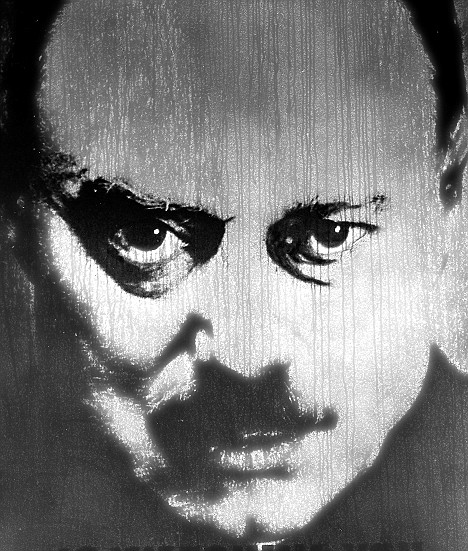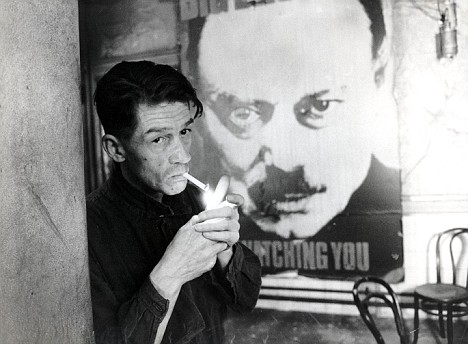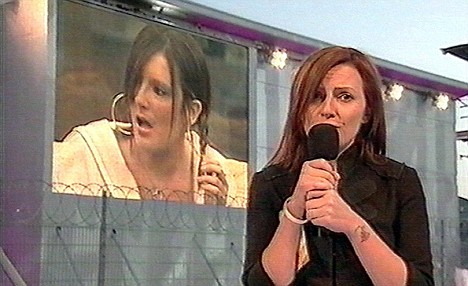Written by Robert Harris
Nineteen Eighty-Four was published in London on Wednesday, June 8, 1949, and in New York five days later. The world was eager for it.
Within 12 months, it had sold around 50,000 hardbacks in the UK; in the U.S. sales were more than one-third of a million. It became a phenomenon.
Sixty years later, no one can say how many millions of copies are in print, both in legitimate editions and samizdat versions. It has been adapted for radio, stage, television and cinema, has been studied, copied and parodied and, above all, ransacked for its ideas and images.

Chilling: The movie 1984, which was made that year, helped bring the work to an even wider audience
As I write, the Mail is reporting that ‘town halls are routinely using controversial Big Brother surveillance laws to spy on their own employees’; the Los Angeles Times is describing a Republican Party consultant as ‘a master of the black art of political newspeak’; The Village Voice is citing ‘a ripe example of doublethink’; and The Guardian is profiling a community leader ‘attacked as part of the PC thought police’.
I could cite hundreds more examples. Nineteen Eighty-Four may not be the greatest novel ever written, but it is certainly the most influential. Even at the time, people knew that something remarkable had occurred.
‘Momentous’, was how Lionel Trilling in The New Yorker hailed its arrival.
Nevertheless, publication day seems to have gone unmarked by any kind of celebration by George Orwell, the author – not surprisingly as he was that day cooped up alone in a stuffy wooden hut, 15ft by 12ft, in a TB sanatorium near Stroud in Gloucestershire, in the throes of being killed by his own creation.
‘I began to relapse about the end of September,’ he wrote to a friend. ‘I could have done something about it then, but I had to finish that wretched book, which, thanks to illness, I had been messing about with for 18 months and which the publishers were harrying me for.’
Working on the Hebridean island of Jura in the cold and damp, the worst possible climate for tuberculosis, Orwell had produced a manuscript illegible to anyone save its author.

Big Brother: John Hurt as Winston Smith in the movie
There was no point in sending it to London as no one could decipher it. Unable to find a local secretary, barely able to walk and sensing that his time was running out, he was therefore obliged to type it himself – 4,000 words a day, seven days a week – mostly done propped up in bed.
The effort produced excruciating pain and high temperatures.
‘It’s a ghastly mess now,’ he moaned to another friend, ‘a good idea ruined.’
A week before he finished typing he was still unsure what to put on the title page: ‘I am hesitating between Nineteen Eighty-Four and The Last Man In Europe.’
Would the novel have achieved such fame if it had been called The Last Man In Europe? Somehow, one doubts it. On such toss-of-the-coin decisions does literary immortality depend.
One is supposed to separate a work of art from the circumstances of its creation, the protagonist of a book from the character of its author. In the case of Nineteen Eighty-Four, this is futile.

George Orwell: The author died six months after 1984 was published
Winston Smith – grey, thin, unable to climb the stairs without stopping to rest, doubled up every morning by ‘a violent coughing fit’ that leaves him lying breathless on the floor – is plainly Orwell.
And the often-remarked-upon ‘nightmarish’ atmosphere of the novel, in which the figures and landscape seem distorted, as if through a fish-eye lens, and the prose jangles with fragments of half-forgotten childhood tunes and nursery rhymes – all this plainly owes much to the hallucinatory fevers that accompany the ravages of tuberculosis.
Orwell never recovered from the effort of composition. He died six months after publication, aged 46.
‘The tragedy of Orwell’s life,’ wrote his friend Cyril Connolly in The Sunday Times in 1961, ‘is that when at last he achieved fame and success he was a dying man and knew it. He had fame and was too ill to leave his room, money and nothing to spend it on .. . he tasted the bitterness of dying.’
As a consequence, a heroic, almost mythic quality quickly came to surround Nineteen Eighty-Four. Imagine if Orwell had recovered from TB and had gone on to become a famous figure on television in the Fifties and Sixties – as he easily might have done, given his talent as a broadcaster – delivering trenchant opinions in his high-pitched Etonian accent (of which, perhaps mercifully, no recording survives).
Nineteen Eighty-Four would still have been the same book. But would it have had the same aura of unassailable posthumous integrity that Orwell’s early death bestowed upon it?
As it is, it remains perfectly crystallised in time: safely immune to any subsequent second thoughts or revisions that might have occurred to Orwell during the controversies of the Cold War.
This is important, I think, both to the reputation of Orwell and to the status of his greatest work. Because Orwell was so deeply involved in contemporary politics it is hard to see how he could have avoided becoming drawn into a rolling controversy about what he meant to say, or not say, in his fiction and the answering of such questions invariably diminishes the power of a work of art.
Indeed, one week after publication, Orwell’s publisher, Fredric Warburg, travelled to his author’s bedside to take down a statement on precisely this issue.
Orwell wished to counter the impression, already especially prevalent in America, that Nineteen Eighty-Four, coming four years after Animal Farm, was intended as an attack on the Left in general and the British Labour Party in particular.
The United Automobile Workers Of America asked Orwell for a statement of his intentions and Orwell obliged, in what was to be his last public utterance: ‘My novel Nineteen Eighty-Four is not intended as an attack on socialism, or on the British Labour Party . . . I do not believe that the kind of society I describe necessarily will arrive, but I believe (allowing of course for the fact that the book is a satire) that something resembling it could arrive.
‘I believe also that totalitarian ideas have taken root in the minds of intellectuals everywhere, and I have tried to draw these ideas out to their logical consequences.’

The chilling idea of Big Brother has now become a common phrase
Clearly, much of Nineteen Eighty-Four is a satire on Stalinism, from the physical description of Big Brother’s face (‘black-haired, black-moustachio’d, full of power and mysterious calm’) to the split in the all-powerful ‘Party’ led by the Trotsky figure, Emmanuel Goldstein, who was branded the hated ‘Enemy of the People’.
And if that were the limit of Orwell’s ambition – to describe England as a Stalinist state – the novel would be regarded today as a brilliant period piece about the horrors of communism, comparable perhaps to his friend Arthur Koestler’s Darkness At Noon: an important work, still read but confined to a limited audience.
However, what sets Nineteen Eighty-Four apart – the difference in ambition which means that millions of people who have never read a word of Orwell nevertheless know what ‘Orwellian’ means – is that it parodies the totalitarian impulse in general.
The original ideology behind this impulse may be communist or fascist, or nationalist or corporate or institutional, but the methods by which it proceeds are in each case the same: the stamping out of the capacity for inpidual thought and freedom, not merely by physical force but by a complete denial of privacy and by the control of all information, even to the extent of policing the language in which thoughts are expressed.
In the world of Nineteen Eighty-Four, ideology is irrelevant. The story picks up where Animal Farm left off. Men and pigs have now become fully interchangeable. Power, administered by a cadre of technocrats, has become an end in itself.
The planet is pided into three continuously (or apparently) warring super-states: Oceania, Eurasia and Eastasia. Given how Churchill, Roosevelt and Stalin had pided up the world between them at their wartime conferences only a few years previously, this vision did not seem entirely fantastic.
Orwell also drew heavily on the writings of the American Trotskyist turned conservative, James Burnham, author of The Managerial Revolution and The Machiavellians. His 1946 summary of Burnham’s theories reads like an outline for Nineteen Eighty-Four:
‘All historical changes finally boil down to the replacement of one ruling class by another. All talk about democracy, liberty, equality, fraternity, all revolutionary movements, all visions of Utopia, or “the classless society”, or “the Kingdom of Heaven on earth”, are humbug (not necessarily conscious humbug) covering the ambitions of some new class which is elbowing its way to power …
‘The new “managerial” societies will not consist of a patchwork of small, independent states, but of great super-states grouped round the main industrial centres in Europe, Asia and America.
‘These super-states will fight among themselves for possession of the remaining uncaptured portions of the earth, but will be unable to conquer one another completely.’
Such was the way the world seemed to be heading in the Forties; such is the world of Nineteen Eighty-Four. It is not to detract from Orwell’s achievement to point out 60 years later that he actually got much of this profoundly wrong.
The surpluses of production in capitalist countries were not used up in continuous warfare but were largely perted to consumer goods; the same has happened even in formerly communist countries.
There are not three great power blocs any more, but two, or four, or one, or none, depending on how you choose to look at it. In the internet age, censorship of images, language and thought have never been harder for governments to control.
Above all, Orwell failed to predict that religious belief would prove such a strong force in the future – a blind spot shrewdly noted by Evelyn Waugh, who lived near Orwell’s sanatorium and who visited him there at least twice around the time the novel appeared.

Television programme: The idea of Big Brother has been exploited in the reality TV show, with Davina McCall as host
‘What makes your version [of the future] spurious to me is the disappearance of the church,’ Waugh wrote to him after reading it in July 1948.
‘Disregard all the supernatural implications if you like, but you must admit its unique character as a social and historical institution. I believe it is inextinguishable.’
The possibility that the all-powerful rulers of Eurasia might one day be toppled by a Polish pope, or that the oil supplies of Oceania might be threatened by fundamentalist Islam, lies far outside the materialist logic of Nineteen Eighty-Four.
But, mercifully, one does not read a novel with a checklist in hand to tick off the accuracy of its predictions. One reads it for its characters: to experience the world they inhabit and to discover what will happen to them next.
Curiously enough, Orwell was probably a better journalist and essayist than he was a novelist – in fact, he is arguably the best journalist and essayist in the English language.
Yet if he had written Nineteen Eighty-Four as a work of non-fiction it would have been forgotten years ago. It was by using his creative imagination to transmute his ideas into fiction that Orwell produced something timeless.
Nineteen Eighty-Four is a standing rebuke to all those who think history or biography can ever be superior to the novel. Big Brother, the Thought Police, Newspeak, Room 101, telescreens, Doublethink, the Two-Minute Hate, the Ministry of Love, 2+2=5, Airstrip One, unperson – one has only to list the words to realise how central Nineteen Eighty-Four has become to our collective imagination.
But what put the ideas there in the first place, and what keeps them there still, is the story of Winston Smith and his doomed love affair with Julia, the girl in the oily overalls who works on the novel-writing machines in the Fiction Department.
The frail, hysterical, cowardly, misogynistic (‘he disliked nearly all women and especially the young and pretty ones’) Winston, with his bad chest and varicose veins, is one of the most unlikely heroes in modern fiction, and yet also one of the most compelling, and by making us believe in him Orwell makes us believe in his fictional landscape.
He does this with the most wonderful economy and clarity (‘good prose is like a windowpane,’ he once maintained), most memorably perhaps in the famous scene in which the lovers are surprised in bed by the Thought Police: “‘We are the dead,” he said. “We are the dead,” echoed Julia dutifully.
‘”You are the dead,” said an iron voice behind them.”
No wonder one of the last letters Orwell received was from Sidney Sheldon, the screenwriter and best-selling novelist, who was anxious to buy the dramatic rights.
From its arresting opening line onwards, Nineteen Eighty-Four functions as an extremely proficient piece of popular entertainment. It has tension, surprises and a good plot. Reading it is a pleasure, not a chore.
In an era when so much serious fiction seems designed merely for the author’s own gratification, or at best for a limited literary coterie, here is a novel with exactly the opposite intention. Orwell’s painfully tapped- out typescript (flimsy top copy and two carbons) left his hands, went out into the world and changed it.
It performed the signal service of nailing for ever certain tricks and tendencies of the ruling classes. It set us on our guard. Sixty years on, that is an achievement worth celebrating.
- This is the introduction to the official 60th anniversary edition of Nineteen Eighty-Four